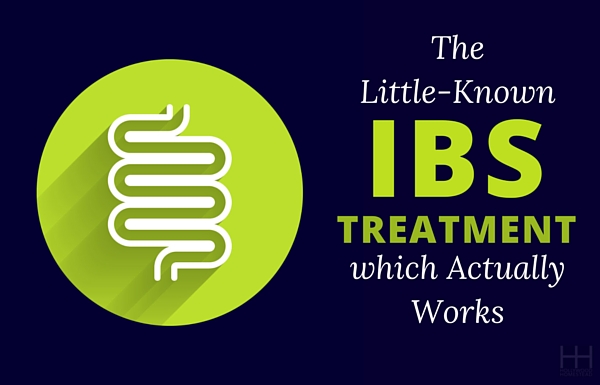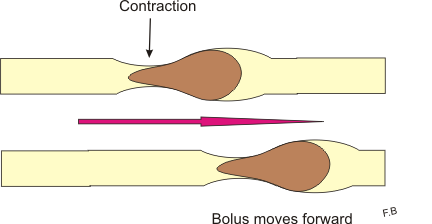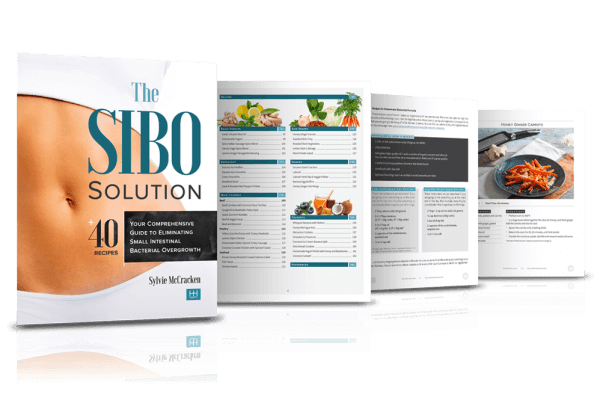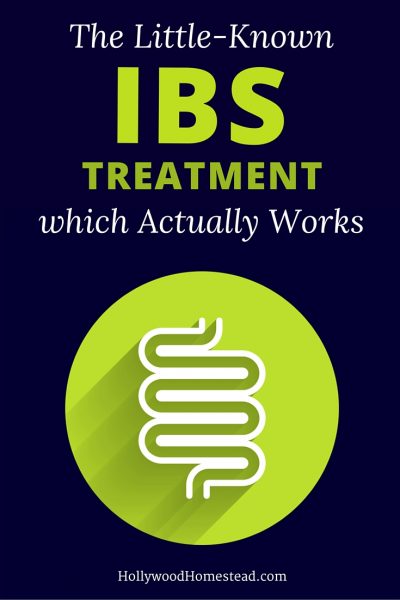
Two of the most common treatments for IBS are fiber supplements for constipation and antispasmodics for diarrhea. As I talk about in this post about common IBS treatments, neither of these treatments solve the underlying cause of IBS. In a fact, they could make your IBS worse in the long run.
Both diarrhea and constipation result because of problems with motility. Motility refers to the wave-like contractions of the muscles in the GI tract which move food and waste throughout it. There are two types of motility. The first is peristalsis and it moves food that you have eaten.

The second type of motility doesn’t get talked about as much, but it is very important for maintaining a healthy balance of gut bacteria. It is called the Migrating Motor Complex (MMC). You can help control your MMC — and thus treat your IBS — by using prokinetics.
The Migrating Motor Complex
Unlike peristalsis which is triggered when you eat, taste or thinking about food in order to start the digestion system, the MMC occurs after you haven’t eaten food in a while. Researchers believe that the MMC acts like a “housekeeping” function to keep our intestines clean.
Though medical researchers have known about the MMC for a long time now, there is a lot we don’t know about it and many doctors don’t even realize how important it is for gut health and preventing/treating GI diseases like IBS.
There are actually two different MMC. The first MMC starts in your stomach and travels through the small intestine. The second MMC starts duodenum and travels up to the ileocecal valve in the large intestine.
The wave-like movements push undigested food and waste out of our small intestines. There are two main ways that the MMC helps us keep our gut bacteria balanced. The first is by removing waste from the intestines. When your small intestine is clear, then bacteria won’t be able to feed off of it and grow out of control. The second way MMC helps is because its sweeping wave-like motions clean out excess bacteria.
During MMC, there are also increases in gastric, biliary, and pancreatic secretions. These secretions probably also help clean out the small intestine of bacteria buildup.
Studies have shown that people with IBS have disrupted MMC. It is unclear how this happened. It could be that a bacterial infection disrupted the balance of the gut flora and then the gut flora wasn’t able to signal the MMC properly. Or maybe it was bad diet which damaged the nerves in the gut so MMC couldn’t function properly. Regardless of the cause, if your MMC isn’t working properly, you are going to end up with a buildup of bacteria in your gut. This bacteria buildup (SIBO) might be the real cause of your IBS.
To cure SIBO (if you are one of the 84% of IBS patients who test positive for it) or reset your gut bacteria (if your gut bacteria is unbalanced but not necessarily overgrown as is the case with SIBO), then you must stimulate the MMC to make sure waste is getting flushed out of the intestines. If you have diarrhea, the idea of stimulating your MMC might seem scary – you don’t want more movement happening! But it is important to realize that the MMC doesn’t go past the large intestine. It will not worsen your diarrhea.
UPDATE:
Good news! There are now SIBO breath tests that you can order directly without a doctor’s order! While I’m a HUGE fan of having a doctor’s guidance, I understand the need to know whether you have SIBO or not before you invest in a practitioner.
You can order the test and it will be sent to your home (note that some states still don’t allow you to order tests; sorry). You can learn more about the types of SIBO breath tests here.
***Use the coupon code HOLLYWOOD to get an additional $5 off. The coupon applies to all lab tests that you order!
Do you have IBS? Download our free guide 7 Things You Wish Your Doctor Told You About IBS.
Cycles of the MMC
Peristalsis occurs when you eat food. By contrast, the MMC only starts when you haven’t eaten food for a while. Again, this has to do with the apparent role of the MMC as a housekeeper to get out all that undigested food which is why prokinetics before bed are a good idea.
Cycles of the MMC can vary a lot depending on the person. However, research generally shows that the MMC starts about 1 ½ to 2 hours after not eating. If you are the type of person who “grazes” on food throughout the day, you could be preventing your MMC from starting! Registered Dietician Tamara Duker Freuman says that you should lay off snacking if you’ve got GI problems related to motility.
Once it begins, the MMC is divided into 4 phases:
- A calm period lasting about 45 to 60 minutes
- A period of peristaltic contractions which increase in frequency and last for about 30 minutes
- A period of rapid, evenly-spaced peristaltic contractions lasting about 5 to 15 minutes
- A short transition period until phase 1 starts again
One interesting thing to note is that there appears to be a link between MMC cycles and sleep cycles. They appear in similar frequency, have cyclic patterns, and are disrupted by sensory stimuli (such as food with the MMC). There are theories that they are linked, which makes one wonder if lack of sleep could be related to IBS in this way.
Wait At Least 4-5 Hours Between Meals
Do the math: It takes about 1 ½ to 2 hours for the MMC to begin. Then it takes about 1 hour 45 minutes for the MMC to go through all its phases. If you eat during this time, then the MMC will stop. To make sure the MMC is able to do its housekeeping job, you’ve really got to wait at least 3 hours 45 minutes between meals, without grazing or snacking.
Dr. Pimental, who is a leading expert on IBS, originally said in his book A New IBS Solution that you should wait 3-5 hours between meals. Then he changed his recommendation to 4-5 hours. Everyone’s MMC seems to be a bit different. To play it safe, I’d wait for at least 5 hours between meals. That means no snacks, coffee, tea, or anything except water.
Can’t I Just Take a Laxative for IBS?
The problem with laxatives is that they do not trigger the MMC. Some types of laxatives act as stimulants which do trigger peristalsis, so food is moved throughout the GI tract faster – but it won’t help clean out any leftover undigested particles which linger about, nor any excess bacteria. Laxatives also don’t trigger gastric, biliary, or pancreatic secretions like the MMC does to clean out bacteria.
Other types of laxatives are not stimulants, but rather “stool softeners.” They work by drawing water from the intestines and into stool, so your constipation essentially turns to diarrhea. Aside from dehydrating you, these laxatives are made from fiber which could be fermentable – which is a major no-no for IBS and SIBO!
Of course, if constipation is a big issue for you, the occasional use of glycerine suppositories is absolutely fine but just know this won’t do a thing for your MMC.
Using Prokinetics to Stimulate the MMC
I used prokinetics along with the elemental diet to reset my gut bacteria, but note that my IBS was really SIBO. What worked for me might not work for you, or even for someone else who had IBS misdiagnosed as SIBO. Check with your doctor to see which prokinetic is right for you.
The prokinetics I used in my treatment were Motilpro, Iberogast, and Erithromycin.
Three prokinetics which have shown promise in treating IBS are Tegaserod, Cisapride, and Renzapride. Unfortunately, there have only been limited studies on these and even then in just constipation-dominant and mixed IBS.
I talk more about how to use prokinetis to fix motility in my ebook The SIBO Solution. Get the ebook here.


References:
http://my.chriskresser.com/seminar/interview-with-dr-siebecker-on-sibo/
https://www.nlm.nih.gov/medlineplus/ency/article/002282.htm
health.usnews.com/health-news/blogs/eat-run/2014/01/28/how-grazing-affects-your-digestive-function
http://www.vivo.colostate.edu/hbooks/pathphys/digestion/smallgut/motility.html
https://www.hon.ch/OESO/books/Vol_5_Eso_Junction/Articles/art014.html
http://www.ncbi.nlm.nih.gov/pubmed/2007745
http://www.digestivedistress.com/motility-rx
Latest posts by Sylvie McCracken (see all)
- Treating H. Pylori (Part 3): What H. Pylori Does to the Body - August 8, 2022
- Treating H. Pylori (Part 2): How H. Pylori is Contracted - August 3, 2022
- Understanding Beef Labels: Organic, Pastured, Grass-Fed & Grain-Finished - July 25, 2022

So, even black coffee disrupts the MMC?
Hi, could you tell me if you continued to take the prokinetics for long term or of you stopped at some point and what that duration was?
When do you take the pro kinetic then? During the 4-5 hours?
HI Sylvie! Does taking supplements/ medications during the 4-5 hour fast interrupt the MMC process? I take vitamin c, magnesium, LDN, and MotilPro 2 huts fr eating right before bed. Is this messing up my overnight fast?
Thanks, Amber ????
This is one of the BEST explanations I’ve ever read about the MMC and the differences between MMC and peristalsis. Now I understand why prokinetics aren’t helping my constipation 😉 Thanks so much for the informative post.
You’re so welcome, Lindsay. Glad it was helpful!
Wow, I’ve really learned something new today! Never heard of MMC before! But I’m wondering if this could be the key to something I’ve been wondering about for a while and haven’t found an answer to. To start, I don’t think I have SIBO or anything that severe, although I know I have some food sensitivities. But one thing I’ve noticed for several years now is that I have LOTS of gas, but not smelly gas, just lots of “wind”, that mostly only comes on after not eating anything for several hours. I’ve always wondered my I got this then, and not while things were actively digesting.
What if you are underweight from sibo and have a lifestyle and job where you are very active and you need those power snacks (nuts, seeds, bananas, collagen smoothies etc) to fuel your body. The 4-5 hours just is too long and I’m like 10-15 pounds underweight? My main meals are full of protein, healthy fats, cooked veggies etc..but, i just still get really hungry in-between meals, what is one to do??
I did it for 2 weeks with Absorb unsweetened and it wasn’t bad at all. I was never hungry- really! My skin completely cleared up and I had a ton of energy. I added some macadamia nut oil or lemon flavored cod liver oil for healthy fat. I also followed the supplement protocol in Sylvia’s book to the letter and NO antibiotics. I feel so much better. My 1st thought is no longer, “Where’s the closest bathroom?”. I continue to avoid all sugar which I believe keeps it from coming back.
Good luck!
Wow, so happy for you Linda. Thanks for sharing.
Hi there!
I’m curious because of your mention of the elemental diet – did that work in curing your SIBO? I’ve tried 3 rounds of 2 types of antibiotics to kill SIBO and it keeps coming back, headstrong. My ND has mentioned the elemental diet approach several times, but I just can’t imagine going 2 weeks without real food and still being a fully functioning human being. Plus, talk about miserable, especially if there’s a big chance it won’t even work for me.
I would love to hear 🙂
Hi Kyla,
Yep! You might like this post where I talk about it in more depth: https://hollywoodhomestead.com/elemental-diet/